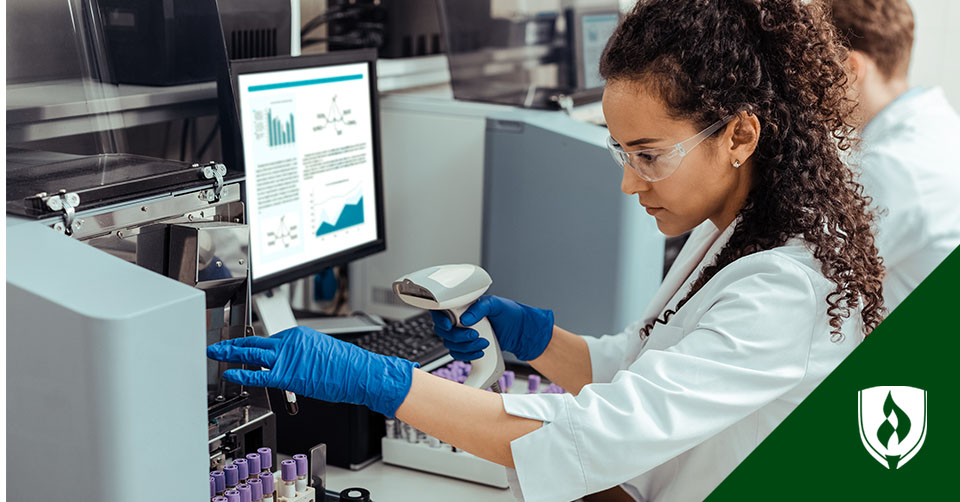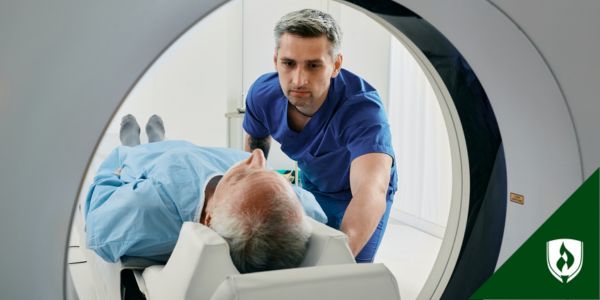
If you’ve started the process of exploring potential healthcare careers, there’s a good chance you’ve encountered the term “allied health” in your search. While a job is a job no matter the label, you might still be wondering which roles this categorization applies to and why the term exists.
If that sounds like you, you’re in the right place. In this article, we’ll take a closer look at the concept of allied health professionals, the roles associated with it and a brief look at what they do in their day-to-day work.
What is allied health?
The term allied health applies to a broad range of careers found outside the disciplines of medicine, optometry, dentistry, pharmacy and nursing.
According to the Association of Schools Advancing Health Professions (ASAHP), allied health refers to professionals who “… use scientific principles and evidence-based practice for the diagnosis, evaluation and treatment of acute and chronic diseases; promote disease prevention and wellness for optimum health, and apply administration and management skills to support healthcare systems in a variety of settings.”1
This definition obviously covers a lot of professions, with the ASAHP sharing that some estimates suggest “as much as 60 percent of the U.S. healthcare workforce may be classified as allied health.”1
You don’t have to look far to find an allied health professional in a healthcare facility, and for good reason. The healthcare field underwent massive changes post-WWII as scientific advancements in treatments and diagnostic abilities lead to a surge in demand for skilled healthcare professionals that didn’t fit neatly into the more established fields of nursing and medicine. With that surge of new roles and occupations came the need for a term to group them all—and that’s where the category of “allied health” was born.
It's also worth noting that not everyone has a uniformly agreed upon definition of what roles are considered allied health. What may be considered an allied health career in one country may be legally classified as a distinct healthcare subspecialty in another. This is not likely to have a huge practical impact on you as an aspiring healthcare worker, but it can help clear up potential confusion.
Common allied health careers and what they do
One of the easiest ways to understand the category of allied health is to consider the types of roles that typically fall under this grouping and what they do in their day-to-day work. Let’s take a look at some of the most common allied health careers:
1. Medical assistant
What they do: These versatile healthcare professionals are true utility players. Medical assistants work in a variety of healthcare settings where they are tasked with both basic direct patient care and administrative duties. This can include tasks like scheduling appointments, filing patient information, recording vital signs, administering vaccinations and more.
2. Pharmacy technician
What they do: Pharmacy technicians are the trusted hands in a pharmacy setting. They work under the supervision of pharmacists to gather patient orders, prepare medications, provide instruction and guidance to patients regarding their medications, and help resolve billing and payment issues with insurance providers.
3. Radiologic technologist
What they do: Looking for a career with a unique perspective? Radiologic technologists get an inside look at the internal structures of patients’ bodies as they work to capture the diagnostic images used to identify and treat health issues. These healthcare pros work directly with patients to explain procedures and position them appropriately for imaging like X-rays, CT scans and more.
4. Nuclear medicine technologist
What they do: Another diagnostic imaging career path, nuclear medicine technologists prepare radioactive drugs (radiopharmaceuticals) and administer them to patients, which allows for specialized imaging tools to provide highly detailed views of what’s going on inside patients’ bodies. Additionally, they may administer radiopharmaceuticals in specified doses to treat tumors or other masses.
5. Surgical technologist
What they do: Are you fascinated by surgical procedures and the precision it takes to have patients “go under the knife” successfully? Surgical technologists play a key role before, during and after an operation. They’re tasked with maintaining a sterile environment, precisely preparing tools and equipment to fit the surgeon’s preference, assisting with patient positioning during procedures and accounting for all equipment after an operation. Given the stakes of surgery, this is a role that requires attention to detail and an ability to think on your feet.
6. Physical therapist assistant
What they do: If you’ve ever had to rehabilitate a torn ligament, there’s a good chance you’ve encountered a physical therapist assistant. These physical therapy professionals work under the supervision of a physical therapist, guiding patients through assigned rehabilitative exercises and monitoring their progress.
7. Medical laboratory technician
What they do: Getting “lab work” done is a common occurrence for patients during healthcare visits, and medical laboratory technicians are some of the folks you’ll find in that lab. While it might not be common for the public to see their work, these healthcare professionals use specialized tools to handle, analyze and record information from bodily fluids and tissue samples.
8. Physical therapist
What they do: These rehabilitative healthcare professionals are tasked with evaluating and diagnosing issues with patients’ musculoskeletal systems, as well as prescribing rehabilitative treatments like exercises, stretches or other therapies like ultrasound treatment. This requires an expansive knowledge of the systems that control our bodies’ movements and what can be done to get them back to as an ideal state as possible.
9. Respiratory therapist
What they do: Despite it being a common refrain for anyone who needs to calm down, not everyone has the luxury of being able to take a nice, deep breath. Those who struggle with breathing problems—often associated with asthma or COPD—receive care from respiratory therapists. These healthcare professionals assess patient lung function, conduct respiratory physiotherapy, monitor progress and also educate patients on how to use ventilators and other respiratory support systems.
10. Speech language pathologists
What they do: Speech language pathologists aim to help individuals with communication disorders. Their work can include diagnosing and addressing stutters, speech impediments, volume regulation issues and other barriers to comprehending language. They often work closely with other healthcare providers, social workers and educators to provide a holistic approach to addressing patient communication issues.
11. Dental hygienist
What they do: Open wide! Dental hygienists are typically the healthcare professionals you’ll encounter during most routine checkups at a dental office. They examine patients for signs of oral conditions like tooth decay, gingivitis or even cancer. They also provide oral hygiene services like tartar and plaque removal and fluoride treatments to help patients maintain good oral health. Additionally, they’ll collect X-ray imaging and report any areas of diagnostic concern to supervising dentists for further evaluation.
12. Health information technician
What they do: There’s a ton of information generated between insurers, healthcare providers and patients. Health information technicians are tasked with the compiling, storing, coding and safe transmission of critical patient health and billing information. They use standardized classification systems for health and treatment information. This information can then be used for ensuring payment, cutting down on over-billing and even informing research with anonymized data.
Is an allied health career in your future?
Now that you know more about how allied health careers are defined, could you see yourself in one of these roles? If so, you’re in for a pleasant surprise—not all of these roles require years and years of extensive education and training.
Our article “Exploring 12 Healthcare Jobs You Can Launch in 2 Years or Less” highlights several potentially appealing options for getting started in healthcare sooner rather than later.
1 “What is Allied Health?” Association of Schools Advancing Health Professions, 2020, [accessed January 2023], https://www.asahp.org/what-is.
Note: Rasmussen University does not offer academic programs for all occupations profiled in this article.




